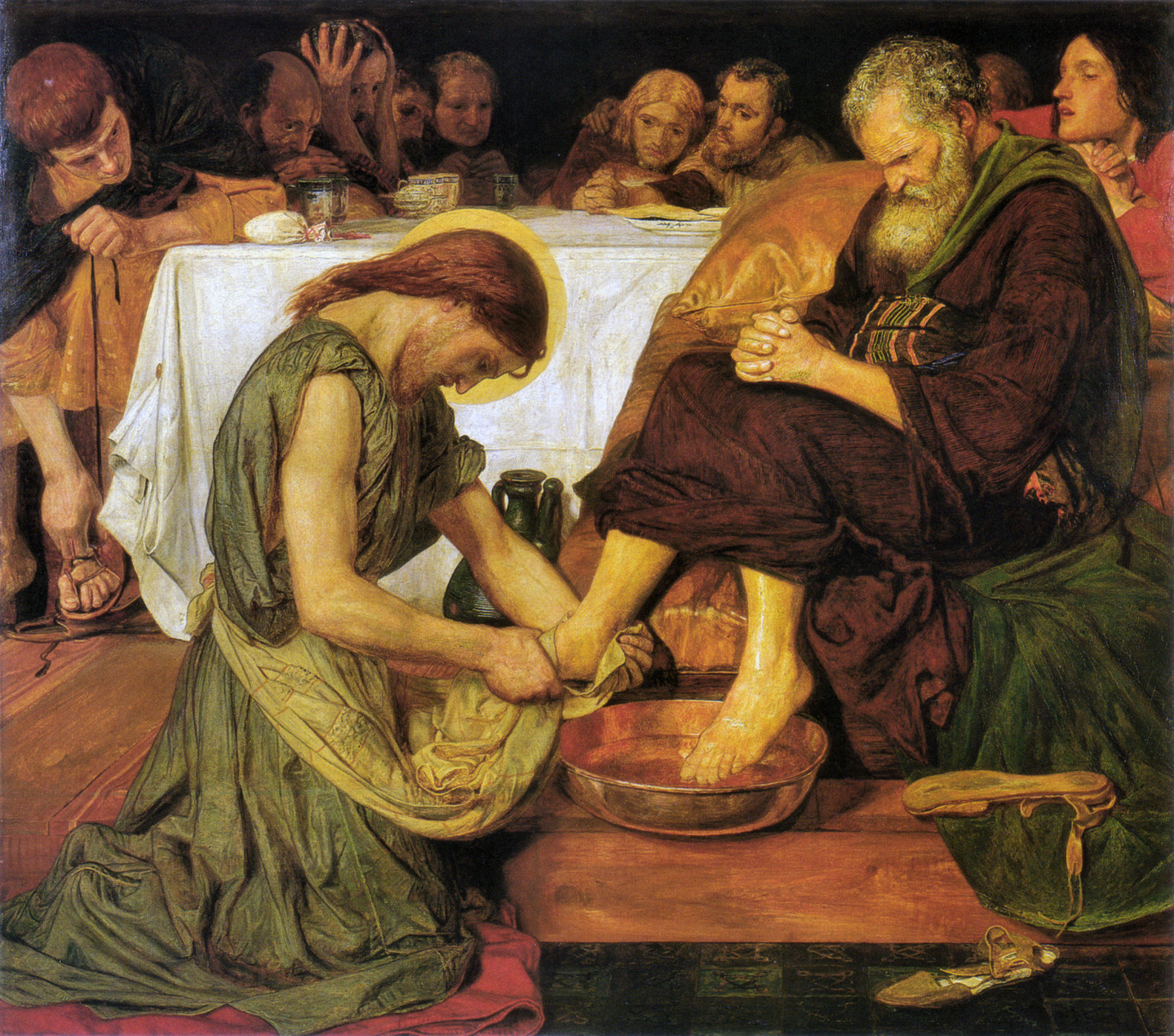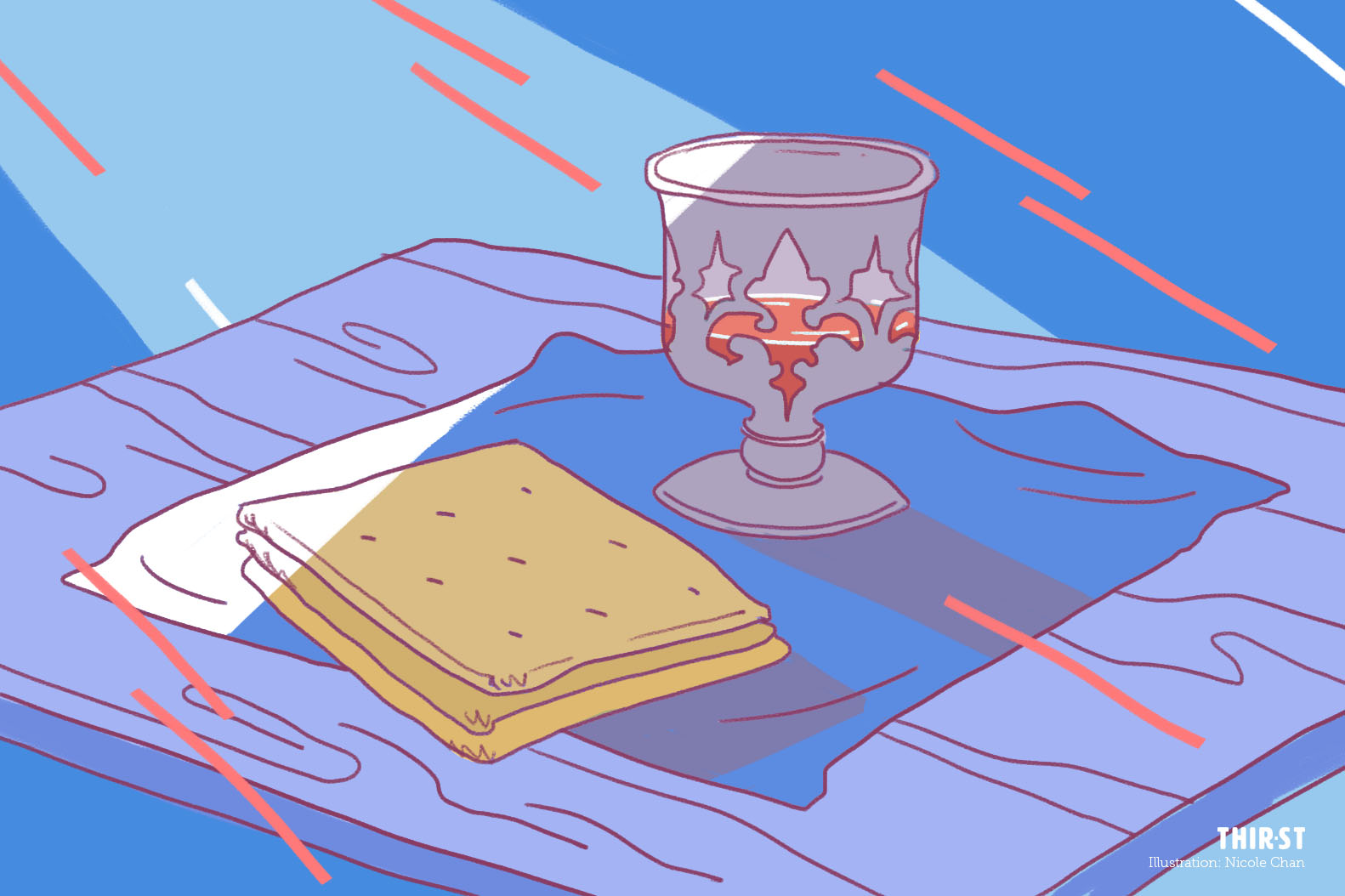It’s the part of the worship service that excites the kids. As the trays of Ribena and wafer get passed around, their eyes light up and their little hands eagerly await their share.
In my church, all who love Jesus are welcome to participate in the Holy Communion including children – hence the non-alcoholic beverage of choice.
While we do this on the first Sunday of every month, the Lord’s Supper also makes a special appearance at our service every year on this day – Maundy Thursday.
We’re not alone. Across the world, many churches observe a communion service on Maundy Thursday in remembrance of what took place 2,000 years ago in Jerusalem.
Documented in all four Gospels – Matthew 26:17-30, Mark 14:12-26, Luke 22:7-38 and John 13:1-30 – the Last Supper that Jesus shared with His disciples was one of two significant events that occurred on the eve of Jesus’ crucifixion.
As we eat and drink of the Lord’s Supper, we’re one with Christ and one with each other.
This fellowship meal initiated by Jesus provides the basis for the Holy Communion we now celebrate, even though the practice differs across congregations.
But whether it’s done using real wine or grape juice, a loaf of bread or biscuit, every week or month, offered to only the baptised or all, at the heart of it I think we can agree: It’s a physical act with deep spiritual significance.
As we eat and drink of the Lord’s Supper, we’re one with Christ and one with each other (1 Corinthians 10:16-17).
NEW COVENANT: A LOVING INVITATION TO A RELATIONSHIP
While the disciples sitting at the table with Jesus would have reflected on what the Lord’s Supper meant in light of the 1,500-year-old Jewish celebration of Passover, we as modern worshippers have the greater privilege of looking back at more than 3,000 years of history and understanding it through the lens of Jesus’ sacrifice.
It’s mind-blowing that the very act of Jesus instituting the Lord’s Supper during the Passover feast was rife with symbolism.
“The Israelites associated their redemption from Egypt with eating the Passover meal. Now Jesus’ disciples were to associate their redemption with Jesus’ death, symbolised in this similar meal,” writes Dr Thomas L. Constable in his Notes on Matthew (2013).

At that time, the Passover had been a major religious festival celebrated by the Israelites for 1,500 years, commemorating their deliverance from slavery in Egypt. It was customary to sacrifice the Passover Lamb to remember how it was through the blood of a lamb that they were spared from a deathly plague that swept across Egypt (Exodus 12:13).
In the Old Covenant, the Israelites had to rely on regular animal sacrifices to cover their guilt and cause God’s judgment to pass over their sin in order to make atonement (at-one-ment) for themselves (Leviticus 17:11).
However, these were only a foreshadowing of the final, perfect sacrifice that was to come in Jesus – the “Passover lamb” (1 Corinthians 5:7) and the “Lamb of God that takes away the sin of the world” (John 1:29).
As we share the elements of the bread and wine, we remember that the bread represents His body that was broken on the cross for us and the cup, His blood shed for the forgiveness of sins.
“For I received from the Lord what I also passed on to you: The Lord Jesus, on the night he was betrayed, took bread, and when he had given thanks, he broke it and said, “This is my body, which is for you; do this in remembrance of me.”
In the same way, after supper he took the cup, saying, “This cup is the new covenant in my blood; do this, whenever you drink it, in remembrance of me.”
For whenever you eat this bread and drink this cup, you proclaim the Lord’s death until he comes.” (1 Corinthians 11:23-26)
Each time we observe the Lord’s Supper, we remember His death and proclaim the Good News that through Christ we’re saved from the slavery of sin (Romans 6:18) and reconciled to God (Colossians 1:22).
What does it mean for us today?
God’s loving invitation to a relationship should prompt a reflection and response.
We don’t have to be worthy to participate in the Lord’s Supper, but we should partake of it in a worthy manner.
“So then, whoever eats the bread or drinks the cup of the Lord in an unworthy manner will be guilty of sinning against the body and blood of the Lord. Everyone ought to examine themselves before they eat of the bread and drink from the cup.” (1 Corinthians 11:27-28)
When I was a younger Christian, I used to wonder how worthy I had to be to join in the Lord’s Supper. But I now understand that Paul’s letter to the church in Corinth on examining yourself referred to whether we truly understood the meaning of the Lord’s sacrifice.
At my church’s Holy Communion service, we pray these words:
“And so, in remembrance of these your mighty acts in Jesus Christ, we offer ourselves in praise and thanksgiving as a holy and living sacrifice, in union with Christ’s offering for us, as we proclaim the mystery of faith.”
As we come to the Lord’s Table, are we aware of our sins and do we realise the price that Christ has paid for our redemption?
Do we take this grace lightly and live in a way that cheapens His sacrifice on the cross? Have we truly repented of our old ways?
NEW COMMAND: A CALL TO LOVE ONE ANOTHER
The second important event that took place on Maundy Thursday as preparations were being made for the Passover meal was this: Jesus washed the feet of His disciples.
Imagine knowing that you’re about to face a very trying physical ordeal the next day. Would you:
- Try and rest as much to conserve your energy?
- Live it up and do something exciting – after all, YOLO right?
Jesus knew he was going to die the next day and this was his last night with His disciples. What did he spend His time doing?
“Now that I, your Lord and Teacher, have washed your feet, you also should wash one another’s feet. I have set you an example that you should do as I have done for you. Very truly I tell you, no servant is greater than his master, nor is a messenger greater than the one who sent him. Now that you know these things, you will be blessed if you do them.” (John 13:14-17)

On Palm Sunday, Jesus entered Jerusalem on a donkey in a striking picture of humility. And 4 days later on Maundy Thursday, he was teaching His inner circle a lesson in humble service.
“Maundy” has its roots in the Latin word mandatum, which means “command”. On this day, Jesus said:
“A new command I give you: Love one another. As I have loved you, so you must love one another. By this everyone will know that you are my disciples, if you love one another.” (John 13:34-35)
Why was this a new command when similar words can be found in the ancient commandment “love your neighbour as yourself”?
The clue perhaps is in these words “as I have loved you”.
The ultimate demonstration of God’s love was about to be revealed to the whole world on the cross the next day (Romans 5:8) and now Jesus was showing a sliver of what sacrificial love looks like.
What does it mean for us today?
As we remember the Lord’s sacrifice, may we also heed the call to love and serve one another.
Dr Warren W. Wiersbe describes it this way in his Bible Commentary of the New Testament: “The world thinks that happiness is a result of others serving us, but real joy comes when we serve others in the name of Christ.
“The world asks, “How many people work for you?” but the Lord asks, “For how many people do you work?”
The Holy Communion is a communal family meal – when we take our seats at the Lord’s Table we’re all equal. As we celebrate the Lord’s Supper, let us unite with not only God, but also one another.
FOR MORE PASSION WEEK STORIES:
- What does the Holy Communion mean to you?
- Have you been participating in the Holy Communion in a worthy manner?
- How can you better love and serve those around you?









